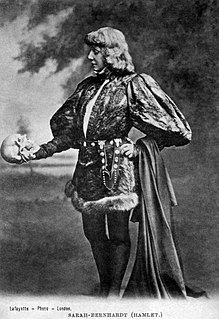
Euripides was a tragedian of classical Athens. Along with Aeschylus and Sophocles, he is one of the three ancient Greek tragedians for whom a significant number of plays have survived. Some ancient scholars attributed 95 plays to him but, according to the Suda, it was 92 at most. Of these, 18 or 19 have survived more or less complete and there are also fragments, some substantial, of most of the other plays. More of his plays have survived intact than those of Aeschylus and Sophocles together, partly because his popularity grew as theirs declined—he became, in the Hellenistic Age, a cornerstone of ancient literary education, along with Homer, Demosthenes, and Menander.
The classical unities, Aristotelian unities, or three unities represent a prescriptive theory of dramatic tragedy that was introduced in Italy in the 16th Century and was influential for three centuries. The three unities are:
- unity of action: a tragedy should have one principal action.
- unity of time: the action in a tragedy should occur over a period of no more than 24 hours.
- unity of place: a tragedy should exist in a single physical location.
A playwright or dramatist is a person who writes plays.

Tragedy is a form of drama based on human suffering that invokes an accompanying catharsis or pleasure in audiences. While many cultures have developed forms that provoke this paradoxical response, the term tragedy often refers to a specific tradition of drama that has played a unique and important role historically in the self-definition of Western civilisation. That tradition has been multiple and discontinuous, yet the term has often been used to invoke a powerful effect of cultural identity and historical continuity—"the Greeks and the Elizabethans, in one cultural form; Hellenes and Christians, in a common activity," as Raymond Williams puts it.
A character is a person or other being in a narrative. The character may be entirely fictional or based on a real-life person, in which case the distinction of a "fictional" versus "real" character may be made. Derived from the ancient Greek word χαρακτήρ, the English word dates from the Restoration, although it became widely used after its appearance in Tom Jones in 1749. From this, the sense of "a part played by an actor" developed. Character, particularly when enacted by an actor in the theatre or cinema, involves "the illusion of being a human person". In literature, characters guide readers through their stories, helping them to understand plots and ponder themes. Since the end of the 18th century, the phrase "in character" has been used to describe an effective impersonation by an actor. Since the 19th century, the art of creating characters, as practiced by actors or writers, has been called characterisation.

Tragicomedy is a literary genre that blends aspects of both tragic and comic forms. Most often seen in dramatic literature, the term can variously describe by either a tragic play which contains enough comic elements to lighten the overall mood or a serious play with a happy ending.

A Greek chorus, or simply chorus in the context of Ancient Greek tragedy, comedy, satyr plays, and modern works inspired by them, is a homogeneous, non-individualised group of performers, who comment with a collective voice on the dramatic action. The chorus consisted of between 12 and 50 players, who variously danced, sang or spoke their lines in unison and sometimes wore masks.

Deus ex machina is a plot device whereby a seemingly unsolvable problem in a story is suddenly and abruptly resolved by an unexpected and seemingly unlikely occurrence, typically so much as to seem contrived. Its function can be to resolve an otherwise irresolvable plot situation, to surprise the audience, to bring the tale to a happy ending, or act as a comedic device.

Aristotle's Poetics is the earliest surviving work of dramatic theory and first extant philosophical treatise to focus on literary theory in the West. This has been the traditional view for centuries. However, recent work is now challenging whether Aristotle focuses on literary theory per se or whether he focuses instead on dramatic musical theory that only has language as one of the elements.
Peripeteia is a reversal of circumstances, or turning point. The term is primarily used with reference to works of literature. The Anglicized form of peripeteia is peripety.

The ancient Greek drama was a theatrical culture that flourished in ancient Greece from 700 BC. The city-state of Athens, which became a significant cultural, political, and military power during this period, was its center, where it was institutionalised as part of a festival called the Dionysia, which honored the god Dionysus. Tragedy, comedy, and the satyr play were the three dramatic genres to emerge there. Athens exported the festival to its numerous colonies.
Greek tragedy is a form of theatre from Ancient Greece and Asia Minor. It reached its most significant form in Athens in the 5th century BC, the works of which are sometimes called Attic tragedy. Greek tragedy is widely believed to be an extension of the ancient rites carried out in honor of Dionysus, and it heavily influenced the theatre of Ancient Rome and the Renaissance. Tragic plots were most often based upon myths from the oral traditions of archaic epics. In tragic theatre, however, these narratives were presented by actors. The most acclaimed Greek tragedians are Aeschylus, Sophocles and Euripides.
Dramatic structure is the structure of a dramatic work such as a play or film. Many scholars have analyzed dramatic structure, beginning with Aristotle in his Poetics. This article looks at Aristotle's analysis of the Greek tragedy and on Gustav Freytag's analysis of ancient Greek and Shakespearean drama.

Ethos is a Greek word meaning "character" that is used to describe the guiding beliefs or ideals that characterize a community, nation, or ideology. The Greeks also used this word to refer to the power of music to influence emotions, behaviours, and even morals. Early Greek stories of Orpheus exhibit this idea in a compelling way. The word's use in rhetoric is closely based on the Greek terminology used by Aristotle in his concept of the three artistic proofs or modes of persuasion.

The term hamartia derives from the Greek ἁμαρτία, from ἁμαρτάνειν hamartánein, which means "to miss the mark" or "to err". It is most often associated with Greek tragedy, although it is also used in Christian theology.
Anagnorisis is a moment in a play or other work when a character makes a critical discovery. Anagnorisis originally meant recognition in its Greek context, not only of a person but also of what that person stood for. Anagnorisis was the hero's sudden awareness of a real situation, the realisation of things as they stood, and finally, the hero's insight into a relationship with an often antagonistic character in Aristotelian tragedy.
Mythos is the term used by Aristotle in his Poetics for the plot of an Athenian tragedy. It is the first of the six elements of tragedy that he gives.

Theatre or theater is a collaborative form of fine art that uses live performers, typically actors or actresses, to present the experience of a real or imagined event before a live audience in a specific place, often a stage. The performers may communicate this experience to the audience through combinations of gesture, speech, song, music, and dance. Elements of art, such as painted scenery and stagecraft such as lighting are used to enhance the physicality, presence and immediacy of the experience. The specific place of the performance is also named by the word "theatre" as derived from the Ancient Greek θέατρον, itself from θεάομαι.
Odysseus Acanthoplex is a lost play by the Athenian dramatist Sophocles. Several fragments are extant. The plot told of Odysseus' death, accidentally killed by his son Telegonus. Some scholars believe that another Sophocles' title, Niptra, is the same play as Odysseus Acanthoplex. Dana Sutton, however, disputes this, suggesting that Niptra was a separate play dealing with Odysseus' return to Ithaca but not with his death.










